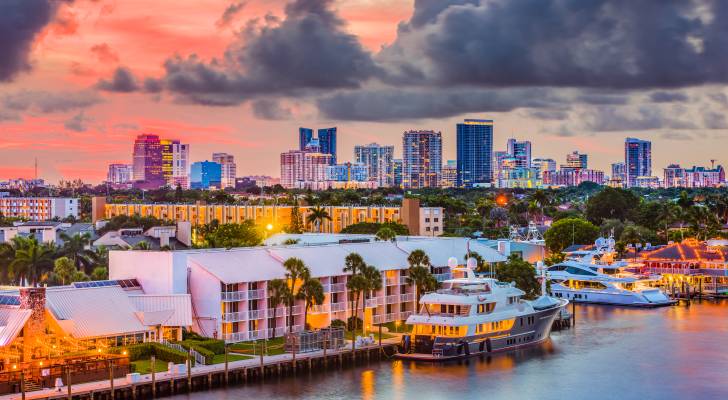
Florida might still be basking in sunshine, but its once-sizzling housing market has simmered down.
The momentum that fueled pricing spikes during the pandemic has taken a sharp turn. For the first time in years, buyers are regaining leverage.
Don’t miss
- I’m 49 years old and have nothing saved for retirement — what should I do? Don’t panic. Here are 5 of the easiest ways you can catch up (and fast)
- Gain potential quarterly income through this $1B private real estate fund — even if you’re not a millionaire. Here’s how to get started with as little as $10
- Robert Kiyosaki warns of a ‘Greater Depression’ coming to the US — with millions of Americans going poor. But he says these 2 ‘easy-money’ assets will bring in ‘great wealth’. How to get in now
Sellers, squeezed by skyrocketing insurance premiums, softening demand and growing inventory, are cutting prices, covering closing costs and easing up on contingencies just to seal the deal.
But is this shift a buyer’s paradise? According to real estate experts, the Florida housing story is more complicated than simply buyer-friendly.
Pandemic housing frenzy hits pause
During the COVID-19 era, a wave of remote workers, sun-seeking transplants and looser restrictions turned Florida into ground zero for red-hot real estate. Builders raced to meet demand. Now that demand has cooled.
Then came two hurricanes, a spiraling insurance crisis and record-breaking homeownership costs. Panic-inducing headlines are drawing comparisons to the 2008 crash, but experts urge caution before sounding the alarm.
“It’s nowhere near that,” real estate expert Vincent Arcuri said recently on Full Circle Florida. “Interest rates are at 6.5 %, if you saw interest rates go anywhere in the 5s, you would see the market shift overnight, properties would start to skyrocket again, so it does have a lot to do with how much I’m putting down and how much is my payment? And that’s what really drives the economics of people buying homes.”
Some homeowners who bought at the peak may be feeling the pinch.
“You have people that came from the pandemic that overpaid, now it’s time to pay the fiddler,” Arcuri said. “I think those people that came in and paid $50,000, $100,000 over market, they’re seeing a reduction now in value, plus they overpaid when they bought, which is offsetting some of the equity in those homes.”
So are the issues local or regional? According to Arcuri, Florida’s housing market isn’t uniform.
Inventory is rising in parts of Florida like Tampa Bay, St. Petersburg and Clearwater, but much of that is due to condos, not single-family homes. The surge is being driven by region-specific factors: new milestone inspection rules, skyrocketing HOA fees and soaring insurance premiums — all of which are dragging down condo sales.
While headline numbers may suggest a broad market slowdown, many statistics are skewed by the flood of condo listings. The situation is more regional than statewide.
Recent hurricanes have only added pressure, particularly on older and coastal condo communities, while inland areas and single-family markets remain more resilient.
So, when will the market bounce back? That largely depends on policy. And as Arcuri puts it, “Until we have significant insurance reform.”
Read more: Want an extra $1,300,000 when you retire? Dave Ramsey says this 7-step plan ‘works every single time’ to kill debt, get rich in America — and that ‘anyone’ can do it
What does it mean for buyers and sellers?
As homes spend more time on the market — especially in places like Tampa Bay and South Florida — buyers are seeing the return of perks not seen since before the pandemic.
But that doesn’t mean today’s buyers have it easy. While home prices may be stabilizing, hidden costs loom:
Florida now has the highest average home insurance premiums in the U.S., with some regions seeing rates above $11,000.
Condo owners in coastal cities are facing 15% plus hikes in HOA fees due to mandatory inspections and storm upgrades.
Mortgage rates remain high, hovering around 6.5%, making monthly payments a real hurdle. Many first-time buyers are already stretched thin by student loans and rising living costs.
Sellers, meanwhile, must adjust to a slower market. Price cuts and concessions are increasingly common, especially for condos facing the brunt of the state’s insurance and structural safety challenges.
So, what should sellers be thinking about? First, price your home realistically. Overpricing means your listing will sit. Consider offering incentives, like covering closing costs, to stand out. Know your costs. High insurance and maintenance fees can make your home harder to sell, so be upfront and ready to discuss those with potential buyers. Most experts agree — this isn’t 2008. Homeowners today typically have equity and more responsible loans. Still, without insurance reform, expect a choppy market.
For now, buyers should do their homework and negotiate hard. Sellers should stay realistic and flexible. Arcuri suggests homeowners just stay put.
“If you’ve got a low interest rate, be patient,” he said. “These markets are cyclical. I’ve seen this happen time and time again. Florida’s fundamentals are still strong. Give it a couple of years, and we’ll be talking about the next housing boom.”
What to read next
- JPMorgan sees gold soaring to $6,000/ounce — use this 1 simple IRA trick to lock in those potential shiny gains (before it’s too late)
- This is how American car dealers use the ‘4-square method’ to make big profits off you — and how you can ensure you pay a fair price for all your vehicle costs
- Here are 5 ‘must have’ items that Americans (almost) always overpay for — and very quickly regret. How many are hurting you?
Like what you read? Join 200,000+ readers and get the best of Moneywise straight to your inbox every week. Subscribe for free.
This article provides information only and should not be construed as advice. It is provided without warranty of any kind.